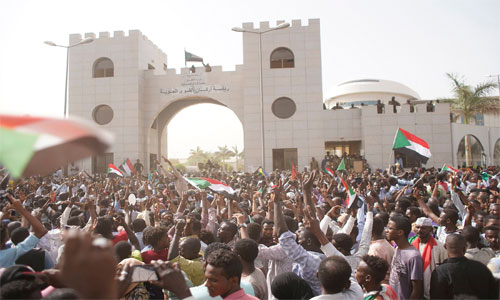Sudanese military removed President Omar Hassan al-Bashir from power on Thursday after months of protests against his 30-year rule, and Sudan’s Vice President and Defense Minister Awad Ibn Auf declared a transitional government for two years, suspension of Transitional Constitution, and state of emergency for three months.
However, demonstrators took to the streets to warn against imposing army rule and called for establishing a civilian government. Meanwhile, the European Union, Britain and the United States, said they supported a peaceful and democratic transition sooner than two years. Antonio Guterres, the United Nations Secretary General, is cited as saying that a military takeover was not the “appropriate response” to Sudan’s challenges calling for “inclusive transition” to bear the dream for “democratic aspirations”.
In response to the public backlash, Sudan’s ruling military council promised the next day that Sudan would have a new civilian-led government.
In a personal interview, a Sudanese journalist Mohammad Abdalla said, “There is a very big change, Sudan has entered a new era. We entered a transitional period. The last regime has been ousted and the minister of defense handed over the power.” He said that there would be a transitional government for two years and “after two years, there will be a general election. The rule of the military is now to arrange and monitor the situation and to prepare a conducive atmosphere for the political parties to exercise their rights”. Abdalla went on to say that presidential institution, parliament and cabinet of Bashir’s administration would be dissolved. Political parties held a meeting on Friday to establish a new cabinet with the participation of political factions and civil organizations without the military, he continued.
Abdalla’s statement suggests that political parties had played essential role in the demonstration as they seek to have their share in the government.
The Sudanese Professionals’ Association (SPA) initially signaled for dialogue with the military about the transition, but later remained adamantly opposed to negotiation with the regime chanting “must go, full stop” slogan. Hence, the demonstrators’ intransigent attitude on the one hand, and regime’s suppressive deal on the other hand left no room for peaceful transition.
The so-called “Troika”, the UK, US, and Norway which have become the de facto sponsors of the 2005 Comprehensive Peace Agreement, called on the government, through issuing a statement, to “release all political detainees, stop the use of violence against peaceful protestors, remove all restrictions to freedoms, lift the state of emergency and allow for a credible political dialogue in a conducive environment with all key Sudanese actors that has its basis the goal of a political and economic transition to a new type of Sudan”.
It is believed that Bashir’s administration made a terrible mistake as it refused to hold a dialogue with demonstrators. The issue could be resolved peacefully if the government showed flexibility and promised to tackle the challenges. The question is that what was the reason behind Bashir’s hasty decision to resort to violence?
African leaders and the Middle East are most likely to fear the emergence of Arab spring in their states. With a demonstration, those countries resort to violence aiming to disperse the crowd, but pay no consideration to the fact that use of force has constantly backfired.
It is evident that Sudan had been afflicted by poverty, corruption, and civil unrest under three decades of Bashir’s rule, which led to the secession of South Sudan. The mass violence against citizens in Darfur is one of the worst example in the history of Sudan. Allegedly committing genocide in Darfur region during an insurgency that began in 2003 and led to the death of an estimated 300,000 people, Bashir was indicted by the International Criminal Court (ICC), which also issued a warrant for his arrest. But Sudan’s ruling military council has said that it would not extradite Bashir to face allegations of genocide at the ICC; instead he would go on trial in Sudan.
Now as the demonstration has led to the downfall of Bashir’ regime, Sudanese people and political parties should be cautious enough not to fall in civil unrest. They have to control the situation and leave no stone unturned for establishing a democratic community, where all citizens could exercise their rights and freedoms regardless of their caste, creed, or color. In other words, a country which has removed the president is highly vulnerable to civil unrest and each political party may seek to have a greater share in the next government. The people have to pay careful attention to the fact that the vacuum emerged in the wake of regime’s downfall should not be filled with negative elements, which may undo the public sacrifices and successful demonstrations. Thus, an “inclusive transition” is the very need in Sudan.
Home » Opinion » A Need for ‘Inclusive Transition’ in Sudan after Bashir’s Downfall
A Need for ‘Inclusive Transition’ in Sudan after Bashir’s Downfall
| Hujjatullah Zia

